Unit 5 Good manners知识点归纳+练习课件(共88张PPT) 牛津译林版八年级下册
文档属性
| 名称 | Unit 5 Good manners知识点归纳+练习课件(共88张PPT) 牛津译林版八年级下册 |
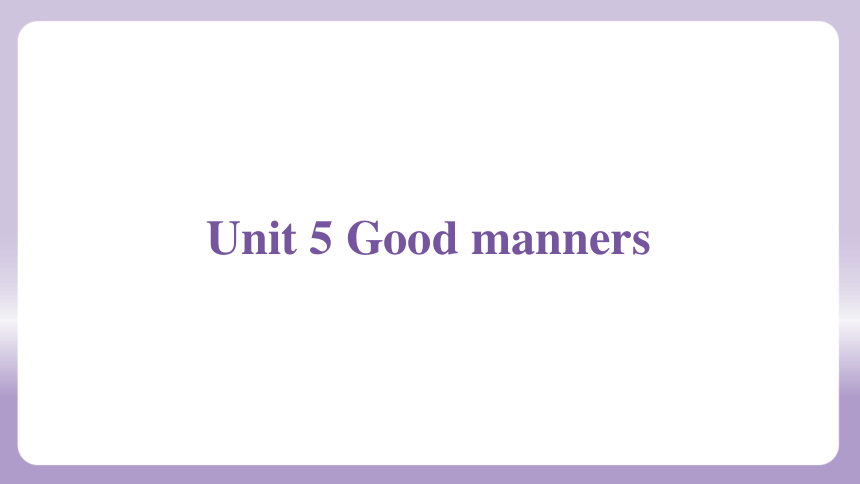
|
|
| 格式 | pptx | ||
| 文件大小 | 1.6MB | ||
| 资源类型 | 教案 | ||
| 版本资源 | 牛津译林版 | ||
| 科目 | 英语 | ||
| 更新时间 | 2024-05-16 17:03:00 | ||
图片预览

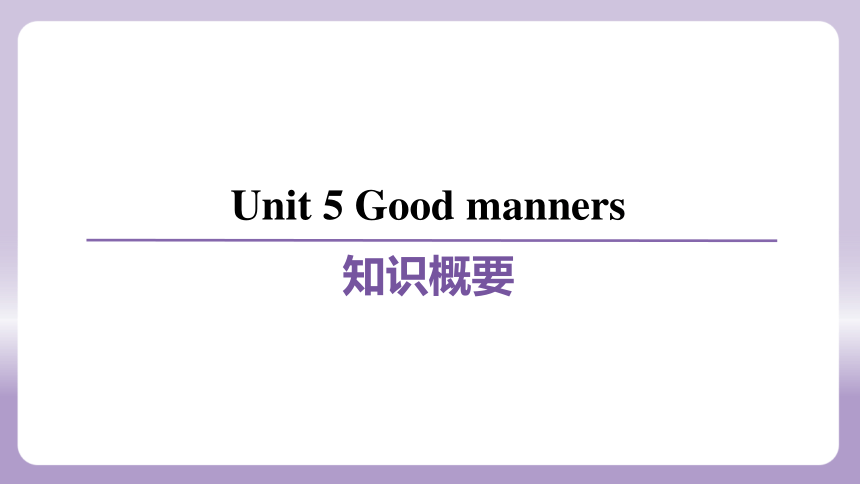
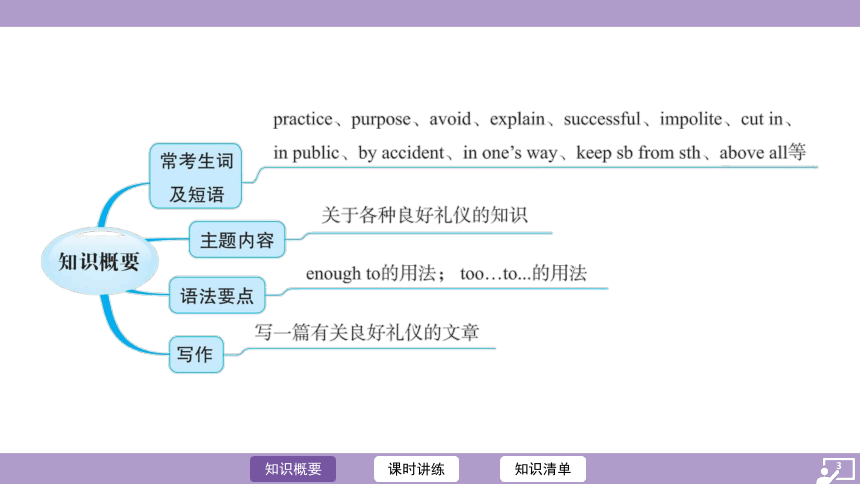
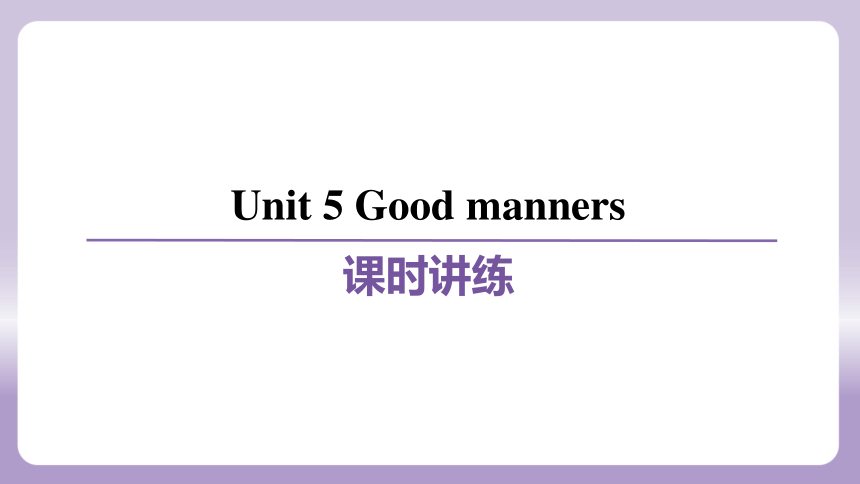
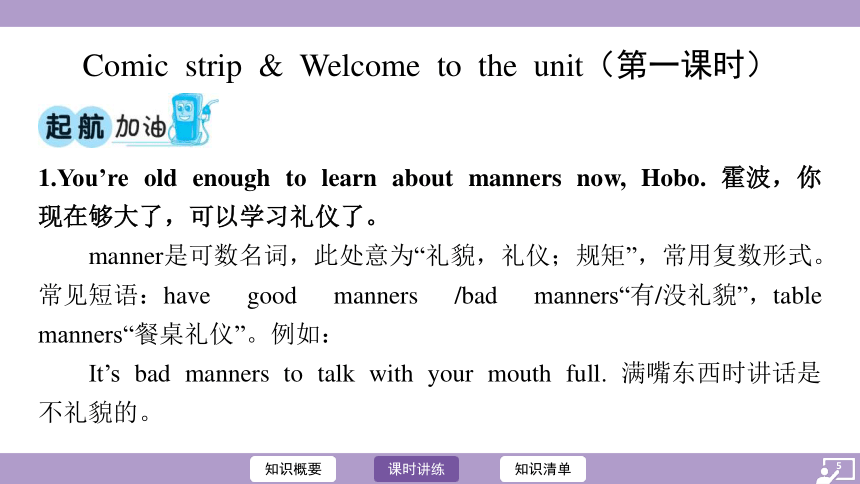
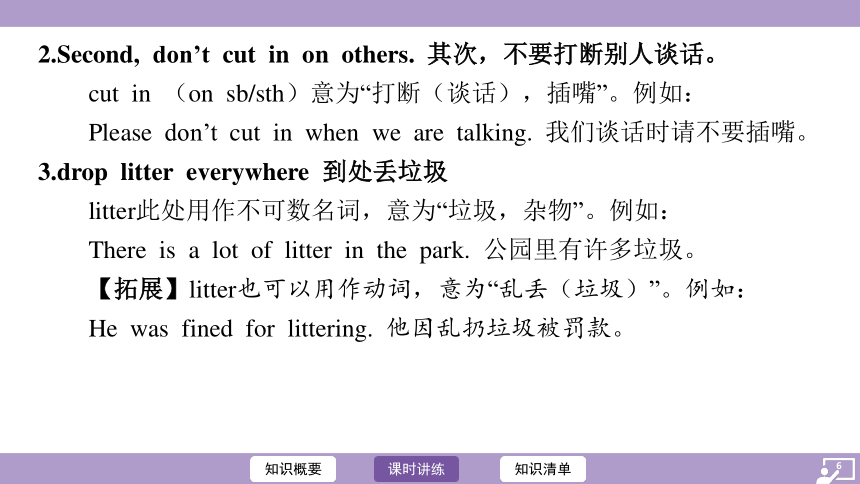
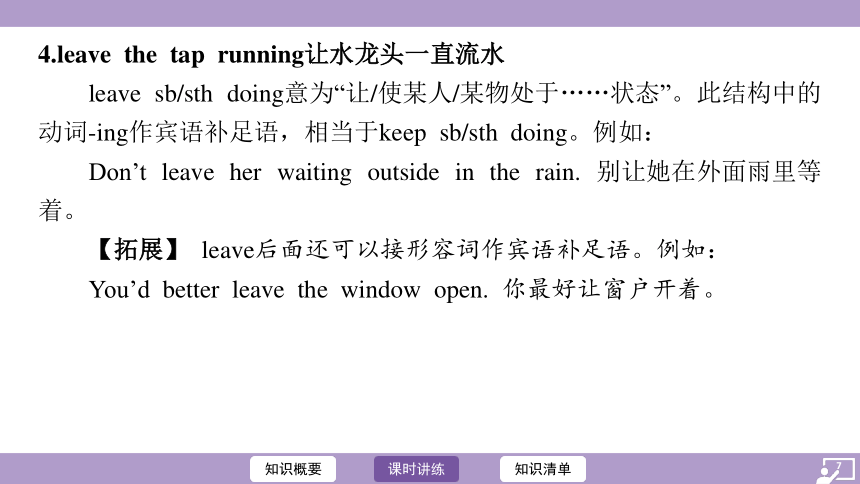
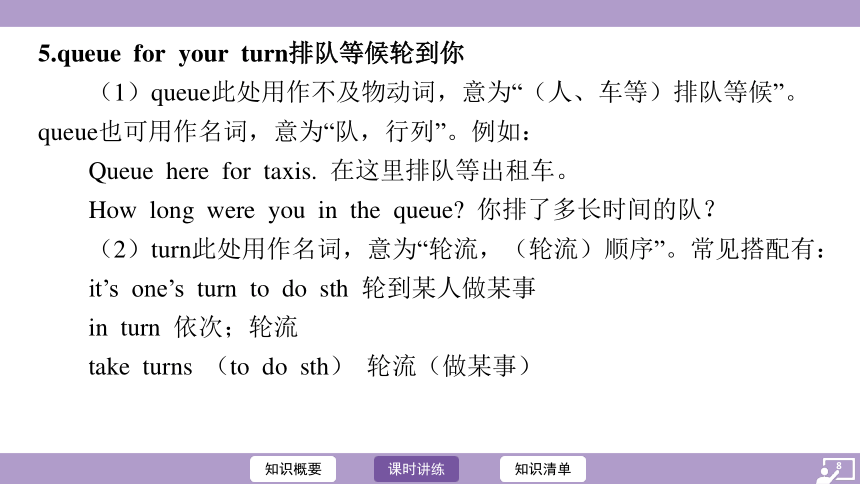
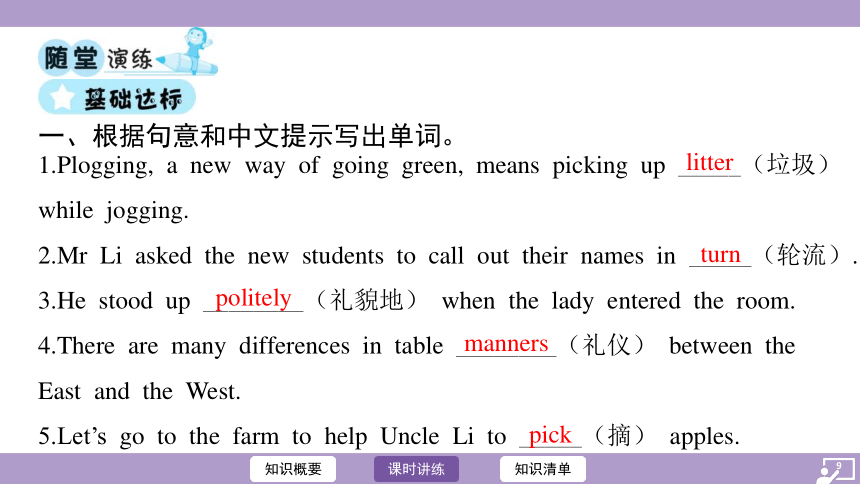
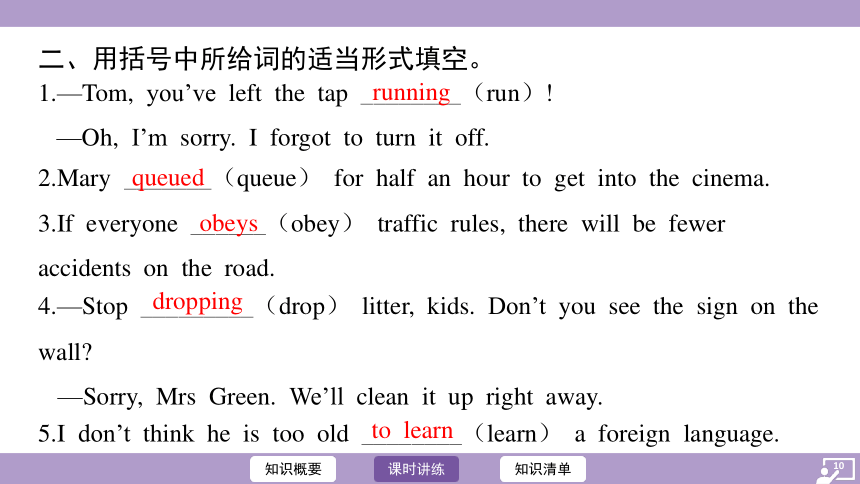

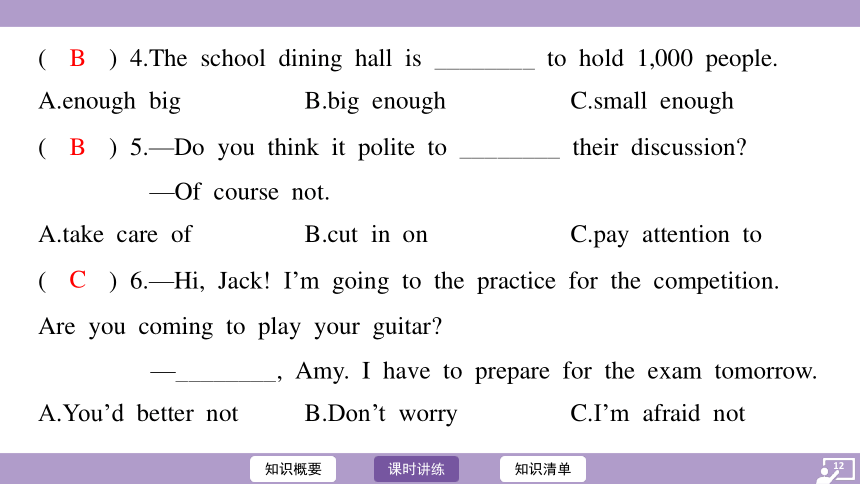
文档简介
(共88张PPT)
Unit 5 Good manners
Unit 5 Good manners
知识概要
Unit 5 Good manners
课时讲练
Comic strip & Welcome to the unit(第一课时)
1.You’re old enough to learn about manners now, Hobo. 霍波,你现在够大了,可以学习礼仪了。
manner是可数名词,此处意为“礼貌,礼仪;规矩”,常用复数形式。常见短语:have good manners /bad manners“有/没礼貌”,table manners“餐桌礼仪”。例如:
It’s bad manners to talk with your mouth full. 满嘴东西时讲话是不礼貌的。
2.Second, don’t cut in on others. 其次,不要打断别人谈话。
cut in (on sb/sth)意为“打断(谈话),插嘴”。例如:
Please don’t cut in when we are talking. 我们谈话时请不要插嘴。
3.drop litter everywhere 到处丢垃圾
litter此处用作不可数名词,意为“垃圾,杂物”。例如:
There is a lot of litter in the park. 公园里有许多垃圾。
【拓展】litter也可以用作动词,意为“乱丢(垃圾)”。例如:
He was fined for littering. 他因乱扔垃圾被罚款。
4.leave the tap running让水龙头一直流水
leave sb/sth doing意为“让/使某人/某物处于……状态”。此结构中的动词-ing作宾语补足语,相当于keep sb/sth doing。例如:
Don’t leave her waiting outside in the rain. 别让她在外面雨里等着。
【拓展】 leave后面还可以接形容词作宾语补足语。例如:
You’d better leave the window open. 你最好让窗户开着。
5.queue for your turn排队等候轮到你
(1)queue此处用作不及物动词,意为“(人、车等)排队等候”。queue也可用作名词,意为“队,行列”。例如:
Queue here for taxis. 在这里排队等出租车。
How long were you in the queue 你排了多长时间的队?
(2)turn此处用作名词,意为“轮流,(轮流)顺序”。常见搭配有:
it’s one’s turn to do sth 轮到某人做某事
in turn 依次;轮流
take turns (to do sth) 轮流(做某事)
一、根据句意和中文提示写出单词。
1.Plogging, a new way of going green, means picking up _____(垃圾)
while jogging.
2.Mr Li asked the new students to call out their names in _____(轮流).
3.He stood up ________(礼貌地) when the lady entered the room.
4.There are many differences in table ________(礼仪) between the
East and the West.
5.Let’s go to the farm to help Uncle Li to _____(摘) apples.
litter
turn
politely
manners
pick
二、用括号中所给词的适当形式填空。
1.—Tom, you’ve left the tap ________(run)!
—Oh, I’m sorry. I forgot to turn it off.
running
2.Mary _______(queue) for half an hour to get into the cinema.
3.If everyone ______(obey) traffic rules, there will be fewer
accidents on the road.
queued
obeys
4.—Stop _________(drop) litter, kids. Don’t you see the sign on the
wall
—Sorry, Mrs Green. We’ll clean it up right away.
dropping
5.I don’t think he is too old ________(learn) a foreign language.
to learn
三、单项选择。
( ) 1.It’s important to keep ________ in the reading room.
B
A.excited B.quiet C.healthy
( ) 2.You look so tired. I think you ________ lie down and have
a rest at once.
C
A.might B.may C.should
( ) 3.Lisa is a middle school student. I often see her ________
the school bus in the morning.
A
A.queue for B.play with C.look after
( ) 4.The school dining hall is ________ to hold 1,000 people.
B
A.enough big B.big enough C.small enough
( ) 5.—Do you think it polite to ________ their discussion
—Of course not.
B
A.take care of B.cut in on C.pay attention to
( ) 6.—Hi, Jack! I’m going to the practice for the competition.
Are you coming to play your guitar
—________, Amy. I have to prepare for the exam tomorrow.
C
A.You’d better not B.Don’t worry C.I’m afraid not
Reading(第二、三课时)
1.What’s the proper way to greet people there, Jenny 珍妮,那儿
的人们打招呼的正确方式是什么?
(1)proper是形容词,意为“符合习俗的;正确的,恰当的,合适的”。它没有比较等级,可用作表语或前置定语。它的副词形式为properly。例如:
The speaker showed some proper examples to make the science report easy to understand. 这名演讲者展示了一些恰当的例子以使这个科学报告容易理解。
The child can’t use chopsticks properly. 那个孩子不能正确使用筷子。
(2)greet是及物动词,意为“问候,打招呼”,greet sb相当于say hello to sb。greet sb with表示“以……方式跟人打招呼”。例如:
The girl is shy and doesn’t like to greet people. 这个女孩腼腆,不爱和人打招呼。
He greeted us with a smile. 他以微笑来向我们打招呼。
2.British people...shake your hand when they meet you for the first time. 英国人……第一次见到你时与你握手。
shake sb’s hand意为“与某人握手”,相当于shake hands with sb。shake hands也可单独使用,意为“握手”。例如:
I will shake her hand when I meet her. =I will shake hands with her when I meet her. 我见到她时会和她握手。
Do people in Italy shake hands when they meet 意大利人见面时握手吗
3.But please avoid subjects like age, weight or money. 但是请避开像年龄、体重或金钱这样的话题。
avoid是及物动词,意为“避免”,后接名词、代词或动词-ing形式。例如:
By avoiding wasting food, we can save money and time. 通过避免浪费粮食,我们可以节省金钱和时间。
4.Do people there behave politely in public 那儿的人们在公共场合
表现得礼貌吗?
(1)behave是不及物动词,意为“表现”,其名词形式为behaviour(行为;举止;态度,表现方式)。例如:
He behaved like a true gentleman. 他表现得像个真正的绅士。
She is pleased with her child’s behaviour. 她对自己孩子的良好行为很满意。
(2)public此处用作名词,意为“公众;社会;公共场所”,常与定冠词the连用。in public意为“当众;公开地”。例如:
The old castle is open to the public. 这座古堡对公众开放。
5.If you are in their way, they won’t touch you or push past you. 如果你挡了他们的路,他们不会碰你或推开你过去。
in one’s way意为“挡住某人的路”。例如:
Please move this chair. It is in my way.请把这把椅子挪走,它挡了我的路。
【拓展】in the way意为“妨碍,挡道”。例如:
He tried to get to the door, but the table was in the way. 他想到门口去,但是桌子挡住了他的路。
6.British people are very polite at home as well, aren’t they 英国人在家也很有礼貌,是吗?
as well意为“也,还有”,常在句中作状语。例如:
Betty can sing, and she can dance as well. 贝蒂会唱歌,也会跳舞。
【辨析】as well、also、too与either
as well 通常用于肯 定句 一般位于句末,其前不用逗号隔开
also 正式用语,通常放在行为动词之前,助动
词、情态动词或连系动词be之后,不用于句
末,常用于句中
too 多用于口语中,通常用于句末,其前可用逗
号也可不用,常可与as well互换
either 通常用于否 定句 常用于句末,其前可用逗号,也可不用
例如:
You know, computers bring troubles as well. 要知道,电脑也带来很多麻烦。
I also want some juice. 我也想要一些果汁。
Peter enjoys playing basketball, and I like it, too. 彼得喜欢打篮球,我也喜欢(打篮球)。
She didn’t know the answer. I didn’t know, either. 她不知道答案,我也不知道。
一、根据句意和中文提示写出单词。
1.The man tried to ______(推) the motorbike up the hill, but he
failed.
2.The two boys became ______(亲密的) friends at last.
3.My mother gives me a _____(吻) every morning when I leave for
school.
push
close
kiss
4.What’s the _______(话题) of today’s talk show
5.In order to ______(避免) making mistakes, Lisa checked her
homework again and again.
6.The new park is open to the _______(民众) twenty-four hours a day.
7.We can’t ______(触摸) the machine while it is working.
8.Teachers should teach students how to _______(表现) well at school.
9.Mr Green had a long ____________(对话, 交谈) with me in the office.
10.Some of us don’t know the _______(正确的,恰当的) way to
brush our teeth.
subject
avoid
public
touch
behave
conversation
proper
二、用括号中所给词的适当形式填空。
1.They sang songs and talked _______(loud) in the classroom.
2.As a Chinese _______(say) goes: Bad news gets about quicker
than good news.
3.Doctors and nurses are brave enough __________(protect) us from
COVID-19.
loudly
saying
to protect
4.She is too selfish ________(share) things with others.
5.It’s necessary for teenagers to learn to express their moods
_________(proper).
6.We should speak to the old ________(polite).
to share
properly
politely
三、单项选择。
( ) 1.—________, where is the meeting room
—This way, please. I will show you there.
B
A.Sorry B.Excuse me C.Come on
( ) 2.—Do you need ________ besides these potatoes
—Some beans, please.
C
A.else something B.else everything C.anything else
( ) 3.Instead of shaking hands, the Maori people greet others
________ a rub(揉擦) of noses.
C
A.in B.on C.with
( ) 4.It’s important to have a goal in life and enjoy the journey
________.
B
A.really B.as well C.either
( ) 5.To make more money, father used to bring some work back
and work ________ late night.
B
A.while B.till C.since
( ) 6.Tom, walk carefully or you might ________ into someone or
something.
A
A.bump B.cut C.push
( ) 7.The safeguard shouted at Jack because he was trying to
________ at the head of the queue.
C
A.cut in B.pick up C.push in
( ) 8.Helen, your bike is ________. Would you mind moving it at
once
B
A.by the way B.in my way C.on the way
四、根据汉语意思完成英语句子。每空一词。
1.杰克森家的孩子们在公共场所都表现得彬彬有礼。
All the kids in the Jackson family behave ________ ___ _______.
politely
in
public
2.在中国,直呼长辈的姓名是无礼的。
___ is rude ___ call the elderly by their names in China.
It
to
3.让我重复一遍:进入博物馆以后,请大家保持低声说话。
Let me repeat: Once in the museum, please _____ your ______ down.
keep
voice
4.我意外删除了我昨晚制作的PPT。
I deleted the PPT I did last night ____ ________.
by
accident
5.正如一句谚语所说,“入乡随俗。”
Just ___ the saying goes, “When in Rome, ____ ___ the Romans do.”
as
do
as
五、根据语篇内容,从方框中选择恰当的单词,并用其正确形式填
空。每个单词只能用一次。
take picture love important wait before public follow wear patient
Remember to be a good boy or a girl any time. It’s 1. . to have good manners, especially in some 2. . places. When you are 3. . in line, don’t jump the queue. Be 4. .. Don’t stand too close to others in the line. Keep 20 cm away if you can.
5. . the advice of the workers when you are having a visit
important
public
waiting
patient
Follow
on a place of interest. Do not climb on exhibitions. Make sure it’s OK to take 6. . before you hold up your camera. When you go to shows, 7. . clean clothes. You should get to the shows 15 minutes 8. . they start. During the shows, turn off your cell phone. Don’t eat during the show. Restaurants will be quite busy. Don’t stay too long when you finish eating. Remember to 9. . your rubbish away after the meal.
Good manners can make you a gentleman or a 10. . lady.
Wherever you are, others will be pleased with you.
pictures
wear
before
take
lovely
take picture love important wait before public follow wear patient
六、完形填空。
Last week, my grandma came to visit us. Mom booked a table at a restaurant for us to have dinner together.
Once we took our . .1. ., the waitress came to us with two menus(菜谱). She passed one to me and the other to Grandma. Grandma is a vegetarian (素食主义者), so she . .2. . needs more time to order the food that she wants to eat. I am an easy eater and can always quickly . .3. . my food when we eat out. “One bottle of apple juice and
one burger,” I said when I was still looking at the menu. Grandma . .4. . what I said. She looked at me and said, “Peter, that is not the correct . .5. . to order your food. Be polite!” Then I said, “One bottle of apple juice and one burger, please.” . .6. . my eyes were still on the pictures on the menu. Grandma was still very unhappy, and she continued, “Peter, can you possibly be more . .7. . and look people in the eye when you talk to them, please ”
Grandma always loves good manners and I didn’t . .8. . to let her down. Feeling ashamed (惭愧的), I quickly . .9. . the menu, looked the waitress in the eye and said, “Can I possibly have a bottle of apple juice and a burger, please ” This time Grandma gave . .10. . a big smile and said, “That’s a good boy.”
( ) 1.A.tables B.seats C.windows
B
( ) 2.A.always B.never C.seldom
A
( ) 3.A.share B.collect C.choose
C
( ) 4.A.sounded B.repeated C.heard
C
( ) 5.A.way B.time C.place
A
( ) 6.A.Or B.But C.If
B
( ) 7.A.polite B.quick C.quiet
A
( ) 8.A.refuse B.want C.fear
B
( ) 9.A.put in B.put down C.picked up
B
( ) 10.A.her B.him C.me
C
Grammar(第四课时)
1.enough to的用法
enough to后接动词原形,常用于句型“主语+be+形容词+enough(for sb)+ to do sth”,表示“……(对某人来说)足够……,能做某事”。例如:
Jim is old enough to take care of himself. 吉姆足够大了,能照顾自己了。
The task is easy enough for her to finish in two days. 这项任务对她来说很容易,两天就能完成。
【拓展】enough to结构可与so...that...句型相互转化。
一般来说,有enough to结构的句子是简单句,而有so...that...结构的句子是复合句。例如:
Tony is strong enough to move the table.=Tony is so strong that he can move the table. 托尼很强壮,可以搬动这个桌子。
2.too...to...的用法
too...to...意为“太……而不能……”,表达一个否定的结果。其中too后面接形容词或副词的原级,to后接动词原形。例如:
The boy is too young to go to school. 这男孩太小,不能上学。
He walked too slowly to get there on time. 他走得太慢了,不能按时到达那里。
【拓展】too...to...结构有时可与so...that...句型及not...enough to结构相互转化。例如:
Amy is too young to drive.=Amy is so young that she can’t drive.=Amy is not old enough to drive. 埃米年纪太小,不能开车。
【注意】enough前的形容词或副词与too后的形容词或副词应是反义关系。
3.在enough to和too...to...两个结构中,当动词不定式的逻辑主语与句子的主语不相同时,常用for引出不定式的逻辑主语。例如:
The ice is thick enough for us to walk on. 冰厚得足以让我们在上面行走。
The riddle is too difficult for me to work out. 这个谜语太难了,我猜不出来。
【拓展】在too...to...或not...enough to结构中,如果动词不定式和主语构成动宾关系,则动词不定式中的动词后面不能重复用代词;如果动词不定式中的动词是不及物动词,则应在动词之后加上适当的介词。例如:
The hat is too large for me to wear. 这顶帽子太大了,我戴不了。
不能说成:The hat is too large for me to wear it.
The room is too small for them to live in. 这房间太小了,他们住不下。
一、用括号中所给词的正确形式填空。
1.Though my brother is only two years old, he’s able to express
himself _______(clear).
clearly
2.—I hear your grandma is ill. Is she better now
—Yes. But she is still too weak ________(walk).
to walk
3.Mr Smith had a __________(discuss) with us about the film just
now.
discussion
4.—Mum, can I ride a bike to school
—No, you can’t. You are not old enough _______(ride) to school.
to ride
5.During the summer holiday, I had enough time ________(read) my
favourite books.
to read
二、单项选择。
( ) 1.—Jane, I think you dance ________ to win the coming
dancing competition.
—Thank you.
C
A.too well B.good enough C.well enough
( ) 2.—I can see a big red apple on the tree.
—Me, too. But we are ________ to pick it.
B
A.too tall B.too short C.tall enough
( ) 3.To become a police officer, you must be ________ to take
action in the face of danger.
A
A.brave enough B.enough brave C.bravely enough
( ) 4.—My grandfather is planning to travel around the world.
—Wow. One is never ________ to enjoy life.
B
A.too young B.too old C.old enough
( ) 5.The bag is ________ heavy for me ________.
A
A.too; to carry B.too; to carry it C.enough; to carry it
三、按要求改写下列句子。每空一词。
1.The Maths problem isn’t difficult and anyone can work it out.
(改为同义句)
The Maths problem is _____ ________ ____ anyone to work out.
easy
enough
for
2.We should obey traffic rules in the street. (对画线部分提问)
______ _______ we ____ in the street
What
should
do
The volunteers are _____ ________ ___ help us with all kinds of
problems.
kind
enough
to
4.The wall was so high that he couldn’t climb over it. (改为同义句)
The wall was ____ high for him ___ climb over.
too
to
5.My father is busy doing his work. He can’t play basketball with me.
(改为同义句)
My father is ____ ______ with his work ___ play basketball with me.
too
busy
to
3.The volunteers are so kind that they help us with all kinds of
problems. (改为同义句)
Integrated skills & Study skills(第五课时)
1.Help explain things... 帮助解释事物……
explain此处用作及物动词,意为“解释”,其后可接名词、代词或从句。常用搭配explain sth to sb意为“向某人解释某事”。例如:
It was difficult to explain the problem to beginners. 对初学者解释这个问题很难。
【注意】explain不能接双宾语,不能说explain sb sth。
2.Keep us safe from danger. 保护我们安全,远离危险。
keep...from...意为“保护……免受……;阻止……做……”。from后可接名词、代词或动名词。例如:
Sunglasses can keep eyes from the sun. 太阳镜能使眼睛免受阳光照射。
The heavy rain kept us from going out. 那场大雨阻止了我们外出。
【拓展】keep sb from doing sth结构相当于stop/prevent sb (from) doing sth,意为“阻止某人做某事”。例如:
We should keep/stop/prevent them from cutting down the trees. 我们应该阻止他们砍伐树木。
3.warn us not to do something 警告我们不要做某事
warn是及物动词,意为“警告,告诫,提醒”。常见搭配有:
(1)warn sb (not) to do sth意为“警告某人(不要)做某事”。例如:
She warned me to keep away from those people. 她告诫我要远离那些人。
Our teachers and parents always warn us not to swim in the river.
我们的老师和家长总是警告我们不要在河里游泳。
(2)warn sb of/about sth意为“警告/提醒某人某事/物”。例如:
A smoke alarm warns us of the danger. 烟雾警报器警告我们有危险。
4.Everybody will be lucky or successful sometime in their life. 每个人在一生中的某个时刻都会是幸运的或成功的。
sometime是副词,意为“在某时”。
【辨析】sometime、some time、sometimes和some times
sometime 副词,意为 “在某时” 指过去或将来的某个不确定的时
间点,用when提问
some time 名词词组,意为 “一段时间” 表示时间段,用how long提问
sometimes 频度副词,意为 “有时” 表示频率,用how often提问
some times 名词词组,意为 “几次/倍” 表示次数或倍数,用how many
times提问
续表
例如:
I’ll visit the Great Wall sometime next year. 明年某个时候我将去参观长城。
She has worked here for some time. 她在这里工作已经有段时间了。
Sometimes I go to school on foot. 我有时走路去上学。
We have been there some times. 我们去过那里几次了。
5.Risk losing everything all at one time. 冒着同时失去一切的危险。
risk此处用作及物动词,意为“冒险做”,其后可接名词或动词-ing形式。常用搭配有:
(1)risk doing sth意为“冒险做某事”。例如:
They risked getting lost in the forest. 他们冒着在森林里迷路的危险。
(2)risk one’s life to do sth意为“冒着生命危险做某事”。例如:
The policeman risked his life to save the boy. 这名警察冒着生命危险去救那个男孩。
一、根据句意和中文提示写出单词。
1.Henry, can we get together and have a party _________(在某时)
next week
2.It’s important to pay attention to _______(公共的) signs.
3.It means you have to do something before others in order to be
__________(成功的).
sometime
public
successful
4.I’m still not clear about it. Could you ________(解释) it to me
again
5.She has a _____(疼痛) in the knee.
6.As everyone knows, ________(练习,实践) makes perfect.
7.It’s better to light one _______(蜡烛) than to curse(咒骂) the
darkness.
explain
pain
practice
candle
二、用括号中所给词的正确形式填空。
1.—What does the sign mean
—It means “No _________(smoke)”.
smoking
2.The old man warned us ________(leave) there right away.
3.Joe can’t risk _______(lose) his job as he has three kids to raise.
to leave
losing
4.—Can I take some photos in the museum
—I’m afraid not. Look at the sign. It says “No _______(photo)”.
photos
5.Actions speak _______(loud) than words.
louder
三、单项选择。
( ) 1.The lyrics(歌词) in the song ________ my thoughts and
feelings. That’s why I enjoy the song so much.
A
A.express B.discuss C.expect
( ) 2.Look at the sign “No swimming”. It warns us ________ in
the lake.
B
A.to swim B.not to swim C.not swimming
( ) 3.We can’t do all the things ________. Let’s finish part of
them each time.
C
A.all the time B.at times C.at one time
( ) 4.—She became famous overnight(一夜之间).
—Well, ________.
A
A.every dog has its day
B.it never rains but it pours
C.better late than never
( ) 5.—We must work as a team, or we will fail a second time.
—Yes. Just as the saying goes, “________”
C
A.One is never too old to learn.
B.He who laughs last laughs best.
C.One finger can’t lift a small stone.
四、根据对话内容,从下面的方框中选出恰当的句子补全对话。有
一个选项是多余的。
A: Hi,Jenny! My new neighbour Alan invited me for dinner tomorrow evening.
B: Wow, he is so kind.
A. Could you give me some advice
B. But I feel a little worried.
C. Then how long should I stay there
D. I have learnt a lot today.
E. First of all, you’d better bring a small gift for the host.
F. How do people start a conversation
A: Yes. _1.(___)___
B: Worried about what
A: I don’t know much about visiting others. _2.(__)___
B
A
A. Could you give me some advice
B. But I feel a little worried.
C. Then how long should I stay there
D. I have learnt a lot today.
E. First of all, you’d better bring a small gift for the host.
F. How do people start a conversation
B: Sure. _3.(__)___
A: Anything else
B: Be sure to arrive on time. Don’t be late. Don’t talk or make too much noise while eating.
E
A. Could you give me some advice
B. But I feel a little worried.
C. Then how long should I stay there
D. I have learnt a lot today.
E. First of all, you’d better bring a small gift for the host.
F. How do people start a conversation
A: _4.(__)___
B: When the host seems to be tired, it’s time to leave.
A: I see. _5.(__)___ Thank you very much.
B: My pleasure.
C
D
A. Could you give me some advice
B. But I feel a little worried.
C. Then how long should I stay there
D. I have learnt a lot today.
E. First of all, you’d better bring a small gift for the host.
F. How do people start a conversation
Task & Self-assessment(第六课时)
1.We should know these rules to make sure that both guests and hosts are comfortable at the table. 我们应该知道这些规则以确保坐在桌子边的客人和主人都轻松自在。
(1)make sure意为“确保;务必;弄明白”。常用于“make sure +
(that)从句”结构。例如:
First you need to make sure you’ve read the whole text. 首先,你
要确保读过整个文本。
(2)at the table意为“在桌子旁”,不一定在吃饭。 例如:
My grandfather is watching TV at the table. 我爷爷正在桌子旁看电视。
【拓展】at table意为“在吃饭”,表示一种状态。例如:
It’s 6:30 p.m. now. Tom and his parents are at table. 现在是晚上六点半,汤姆和他的父母在吃饭。
2.Above all, when you are sitting at the table... 首要的是,你坐在餐桌旁时……
【辨析】above all, first of all与after all
above all 首要的是 指从事物重要性来说的“首先”,
类似于especially
first of all 首先,开始, 第一 表示次序,相当于at first
after all 毕竟,终究; 到底 表示一种让步语气
例如:
Above all, we should learn every subject well. 首要的是,我们应学好各门功课。
First of all, let me ask you some questions. 首先,让我来问你们一些问题。
Don’t worry about him. After all, he is an adult. 别担心他,毕竟他是个成年人了。
一、根据句意和中文提示写出单词。
1.What’s the ________(目的) of your visit
2.Last Saturday about twenty _______(客人) came to Mrs White’s
party.
3.People don’t know the ________(内容) of Professor Chen’s talk.
4.She _______(冒险做) her own life to help a girl out of danger in
the earthquake last year.
5.Daniel is a very famous TV game show _____(主持).
purpose
guests
content
risked
host
二、用括号内所给词的正确形式填空。
1.Remember not to reach over __________(someone) plate for
something.
2.Everyone will be lucky or __________(success) in their life.
3.I feel terrible because of too much ______(noisy) from the factory
nearby.
4.We should not listen to music while ______(do) our homework.
5.It’s ________(polite) to write an email in all capital(大写的)
letters, because it may sound like you are shouting.
someone’s
successful
noise
doing
impolite
三、单项选择。
( ) 1.I’ve come to the ________ that Simon makes a perfect
friend: He’s friendly, helpful and honest.
C
A.direction B.information C.conclusion
( ) 2.Children need many things to grow up happily, but
________, they need love.
A
A.above all B.in all C.after all
( ) 3.Please check your test paper to ________ there are no
mistakes before handing it in.
C
A.find out B.try out C.make sure
( ) 4.The two people ________ each other on the sidewalk-they
were watching their phones while walking.
B
A.got off B.bumped into C.cared about
( ) 5.Jane has spent ________ preparing her daily report and
thinks she can finish it ________ this afternoon.
C
A.some time; sometimes
B.sometime; sometime
C.some time; sometime
( ) 6.—What gift do you want for your new bedroom, Jimmy
—I dream about a bookshelf ________ for a thousand books.
A
A.big enough B.enough big C.too big
四、根据语篇内容,从方框中选择恰当的单词,并用其正确形式填
空。每个单词只能用一次。
noises quiet restaurant from way loud agree breakfast them different
Eating habits are different in different countries. The Chinese have a saying “Eat good things for 1. ., eat a big meal for lunch, but eat less at dinner.” Many people in the USA 2. . that one
breakfast
agree
starts a day with a good breakfast, but their ideas about lunch and
dinner are 3. ..
Most people in America only give 4. . a short time to have their lunch, so they eat a small lunch. After work, they can have more time to eat a big dinner. Also a quiet dinner at home with all the family members talking about their day is a good 5. . to take a good rest after a long, hard day of work.
different
themselves
way
noises quiet restaurant from way loud agree breakfast them different
Eating in 6. . is also different. In China, very often you can hear people talking and laughing 7. ., and they are just having a good time. In America it is not like this. They usually eat a good meal far away 8. . the noisy places. If they make some 9. ., other people in the restaurant will look at them angrily, even the manager of the restaurant will ask them to be 10. ..
restaurants
loudly
from
noises
quiet
noises quiet restaurant from way loud agree breakfast them different
五、阅读理解。
Teaching good manners to kids is very important. It’s best to let them develop good table manners when they are young. So they can carry these when they grow up.
Good eating manners begin with good table manners. Tell your kids that dinner time is family time. There should be no mobile phones or text messages at the table. Instead, mealtime should be used for talking about family things.
Kids should say “please” and “thank you” when asking for things on the table. They should not reach over other people to get things that they want.
Teach your children not to eat with their mouths open or talk with their mouths full. If it’s hard for them to understand, try showing them how it looks and sounds. When they see this, they’ll understand how they look to other people. They should also eat slowly and take small bites(咬).
Washing hands before and after eating is important to health. When eating at a friend’s house, tell your kids to remember to thank the host for the meal. Let them put their own dishes in the sink(洗碗槽) after dinner. For elder children, they can help do the dishes.
根据语篇内容,选择最佳选项。
( ) 1.What is best for kids to learn when they’re young
A
A.Right table manners.
B.Some family things.
C.The meaning of family.
( ) 2.What should kids NOT do according to (根据) the text
C
A. B. C.
( ) 3.What do the underlined words “reach over” mean
B
A.Close. B.Pass. C.Hold.
( ) 4.Which of the following is TRUE
B
A.Kids can only talk about school things during mealtime.
B.Kids should thank the host for the meal after eating.
C.Kids should eat as quickly as possible while eating.
( ) 5.What does the passage mainly tell us
A.Teach kids about good manners.
B.What kids should do to eat happily.
C.What kids should eat to keep fit.
A
六、书面表达。
假设你所在的学校正在积极创建全市文明校园。请你根据下列提示,
以校学生会的名义就“创建文明校园”这一主题,用英语写一封80词左右
的倡议书。开头与结尾已经给出,不计入总词数。
要点提示:
1.保持教室整洁,不乱扔垃圾;2.不在公共场所大声喧哗,在图书
馆里保持安静;3.遵守交通规则;4.举止有礼,互帮互助;5.……
Dear schoolmates,
Our school is trying to be a better place for all of us. We know
good manners are really important. And we can do something for it.
Let’s start from ourselves!
Dear schoolmates,
Our school is trying to be a better place for all of us. We know
good manners are really important. And we can do something for it.
Let’s start from ourselves!
At school, we should keep our classrooms clean and tidy. It is
incorrect to drop litter. In public, we shouldn’t speak loudly. And we
should keep quiet in libraries or reading rooms. What’s more, we
should obey traffic rules and queue for our turn. We should behave
politely and help each other. As students, we should also save water
and power. We can turn off lights when leaving classrooms. I hope everyone can do some small things to make our world better.
Unit 5 Good manners
知识清单
重点短语
1.______________良好的礼仪
good manners
2.___________________打断(谈话),插嘴
cut in (on sb/sth)
3._____________________到处乱扔垃圾
drop litter everywhere
4.________________遵守交通规则
obey traffic rules
5.___________________排队等候
queue for one’s turn
6.________________首次,第一次
for the first time
7._________________与某人握手
shake one’s hand
8.__________公开的,在别人面前
in public
9._________插队,加塞
push in
10._____________挡住某人的路
in one’s way
11.___________妨碍,挡道
in the way
12.___________劳驾
excuse me
13.________也,还有
as well
14.____________一直
all the time
15.____________偶然,意外地
by accident
16._______________自我表达
express oneself
17.__________________忙于某事
be busy with sth
18.___________不久以后
soon after
19.____________一度,曾经;同时
at one time
20._____________________压低声音
keep one’s voice down
21.________________________告诫某人(不)要做某事
warn sb (not) to do sth
22._____________冒险做某事
risk doing sth
23.___________首要的是
above all
重点句型
1.__________________________活到老,学到老。
You’re never too old to learn.
2._____________________________________他们认为插队到别人
They think it’s rude to push in before others.
3.__________________________________________________如你挡了他们的路,他们不会碰你或推开你过去。
If you’re in their way, they won’t touch you or push past you.
They’ll say “Excuse me” and be polite enough to wait until you move.
4.__________________________________________________________他们会说声“打扰了”,并很有礼貌地等你让开。
Just as the saying goes, “When in Rome, do as the Romans do.”
5. ___________________________________________________正如一句谚语所说:“入乡随俗。”
6._____________________________________________你要等到大家都吃完之后才能离开。
Wait for everyone to finish before you leave the table.
7.____________________________________________________________________________________________________我们应该知道这些规则以确保坐在桌子边的客人和主人都轻松自在。
We should know these rules to make sure that both guests and hosts are comfortable at the table.
8._________________________________________________报告的
The purpose of the talk is to teach students rules for eating.
重点语法
1. enough to的用法:后接动词原形,常用于句型“主语+be+形容词+enough(for sb)+ to do sth”,表示“……(对某人来说)足够……,能做某事”。
2. too...to...的用法:意为“太……而不能……”,表达一个否定的结果。
其中too后面接形容词或副词的原级,to后接动词原形。
Unit 5 Good manners
Unit 5 Good manners
知识概要
Unit 5 Good manners
课时讲练
Comic strip & Welcome to the unit(第一课时)
1.You’re old enough to learn about manners now, Hobo. 霍波,你现在够大了,可以学习礼仪了。
manner是可数名词,此处意为“礼貌,礼仪;规矩”,常用复数形式。常见短语:have good manners /bad manners“有/没礼貌”,table manners“餐桌礼仪”。例如:
It’s bad manners to talk with your mouth full. 满嘴东西时讲话是不礼貌的。
2.Second, don’t cut in on others. 其次,不要打断别人谈话。
cut in (on sb/sth)意为“打断(谈话),插嘴”。例如:
Please don’t cut in when we are talking. 我们谈话时请不要插嘴。
3.drop litter everywhere 到处丢垃圾
litter此处用作不可数名词,意为“垃圾,杂物”。例如:
There is a lot of litter in the park. 公园里有许多垃圾。
【拓展】litter也可以用作动词,意为“乱丢(垃圾)”。例如:
He was fined for littering. 他因乱扔垃圾被罚款。
4.leave the tap running让水龙头一直流水
leave sb/sth doing意为“让/使某人/某物处于……状态”。此结构中的动词-ing作宾语补足语,相当于keep sb/sth doing。例如:
Don’t leave her waiting outside in the rain. 别让她在外面雨里等着。
【拓展】 leave后面还可以接形容词作宾语补足语。例如:
You’d better leave the window open. 你最好让窗户开着。
5.queue for your turn排队等候轮到你
(1)queue此处用作不及物动词,意为“(人、车等)排队等候”。queue也可用作名词,意为“队,行列”。例如:
Queue here for taxis. 在这里排队等出租车。
How long were you in the queue 你排了多长时间的队?
(2)turn此处用作名词,意为“轮流,(轮流)顺序”。常见搭配有:
it’s one’s turn to do sth 轮到某人做某事
in turn 依次;轮流
take turns (to do sth) 轮流(做某事)
一、根据句意和中文提示写出单词。
1.Plogging, a new way of going green, means picking up _____(垃圾)
while jogging.
2.Mr Li asked the new students to call out their names in _____(轮流).
3.He stood up ________(礼貌地) when the lady entered the room.
4.There are many differences in table ________(礼仪) between the
East and the West.
5.Let’s go to the farm to help Uncle Li to _____(摘) apples.
litter
turn
politely
manners
pick
二、用括号中所给词的适当形式填空。
1.—Tom, you’ve left the tap ________(run)!
—Oh, I’m sorry. I forgot to turn it off.
running
2.Mary _______(queue) for half an hour to get into the cinema.
3.If everyone ______(obey) traffic rules, there will be fewer
accidents on the road.
queued
obeys
4.—Stop _________(drop) litter, kids. Don’t you see the sign on the
wall
—Sorry, Mrs Green. We’ll clean it up right away.
dropping
5.I don’t think he is too old ________(learn) a foreign language.
to learn
三、单项选择。
( ) 1.It’s important to keep ________ in the reading room.
B
A.excited B.quiet C.healthy
( ) 2.You look so tired. I think you ________ lie down and have
a rest at once.
C
A.might B.may C.should
( ) 3.Lisa is a middle school student. I often see her ________
the school bus in the morning.
A
A.queue for B.play with C.look after
( ) 4.The school dining hall is ________ to hold 1,000 people.
B
A.enough big B.big enough C.small enough
( ) 5.—Do you think it polite to ________ their discussion
—Of course not.
B
A.take care of B.cut in on C.pay attention to
( ) 6.—Hi, Jack! I’m going to the practice for the competition.
Are you coming to play your guitar
—________, Amy. I have to prepare for the exam tomorrow.
C
A.You’d better not B.Don’t worry C.I’m afraid not
Reading(第二、三课时)
1.What’s the proper way to greet people there, Jenny 珍妮,那儿
的人们打招呼的正确方式是什么?
(1)proper是形容词,意为“符合习俗的;正确的,恰当的,合适的”。它没有比较等级,可用作表语或前置定语。它的副词形式为properly。例如:
The speaker showed some proper examples to make the science report easy to understand. 这名演讲者展示了一些恰当的例子以使这个科学报告容易理解。
The child can’t use chopsticks properly. 那个孩子不能正确使用筷子。
(2)greet是及物动词,意为“问候,打招呼”,greet sb相当于say hello to sb。greet sb with表示“以……方式跟人打招呼”。例如:
The girl is shy and doesn’t like to greet people. 这个女孩腼腆,不爱和人打招呼。
He greeted us with a smile. 他以微笑来向我们打招呼。
2.British people...shake your hand when they meet you for the first time. 英国人……第一次见到你时与你握手。
shake sb’s hand意为“与某人握手”,相当于shake hands with sb。shake hands也可单独使用,意为“握手”。例如:
I will shake her hand when I meet her. =I will shake hands with her when I meet her. 我见到她时会和她握手。
Do people in Italy shake hands when they meet 意大利人见面时握手吗
3.But please avoid subjects like age, weight or money. 但是请避开像年龄、体重或金钱这样的话题。
avoid是及物动词,意为“避免”,后接名词、代词或动词-ing形式。例如:
By avoiding wasting food, we can save money and time. 通过避免浪费粮食,我们可以节省金钱和时间。
4.Do people there behave politely in public 那儿的人们在公共场合
表现得礼貌吗?
(1)behave是不及物动词,意为“表现”,其名词形式为behaviour(行为;举止;态度,表现方式)。例如:
He behaved like a true gentleman. 他表现得像个真正的绅士。
She is pleased with her child’s behaviour. 她对自己孩子的良好行为很满意。
(2)public此处用作名词,意为“公众;社会;公共场所”,常与定冠词the连用。in public意为“当众;公开地”。例如:
The old castle is open to the public. 这座古堡对公众开放。
5.If you are in their way, they won’t touch you or push past you. 如果你挡了他们的路,他们不会碰你或推开你过去。
in one’s way意为“挡住某人的路”。例如:
Please move this chair. It is in my way.请把这把椅子挪走,它挡了我的路。
【拓展】in the way意为“妨碍,挡道”。例如:
He tried to get to the door, but the table was in the way. 他想到门口去,但是桌子挡住了他的路。
6.British people are very polite at home as well, aren’t they 英国人在家也很有礼貌,是吗?
as well意为“也,还有”,常在句中作状语。例如:
Betty can sing, and she can dance as well. 贝蒂会唱歌,也会跳舞。
【辨析】as well、also、too与either
as well 通常用于肯 定句 一般位于句末,其前不用逗号隔开
also 正式用语,通常放在行为动词之前,助动
词、情态动词或连系动词be之后,不用于句
末,常用于句中
too 多用于口语中,通常用于句末,其前可用逗
号也可不用,常可与as well互换
either 通常用于否 定句 常用于句末,其前可用逗号,也可不用
例如:
You know, computers bring troubles as well. 要知道,电脑也带来很多麻烦。
I also want some juice. 我也想要一些果汁。
Peter enjoys playing basketball, and I like it, too. 彼得喜欢打篮球,我也喜欢(打篮球)。
She didn’t know the answer. I didn’t know, either. 她不知道答案,我也不知道。
一、根据句意和中文提示写出单词。
1.The man tried to ______(推) the motorbike up the hill, but he
failed.
2.The two boys became ______(亲密的) friends at last.
3.My mother gives me a _____(吻) every morning when I leave for
school.
push
close
kiss
4.What’s the _______(话题) of today’s talk show
5.In order to ______(避免) making mistakes, Lisa checked her
homework again and again.
6.The new park is open to the _______(民众) twenty-four hours a day.
7.We can’t ______(触摸) the machine while it is working.
8.Teachers should teach students how to _______(表现) well at school.
9.Mr Green had a long ____________(对话, 交谈) with me in the office.
10.Some of us don’t know the _______(正确的,恰当的) way to
brush our teeth.
subject
avoid
public
touch
behave
conversation
proper
二、用括号中所给词的适当形式填空。
1.They sang songs and talked _______(loud) in the classroom.
2.As a Chinese _______(say) goes: Bad news gets about quicker
than good news.
3.Doctors and nurses are brave enough __________(protect) us from
COVID-19.
loudly
saying
to protect
4.She is too selfish ________(share) things with others.
5.It’s necessary for teenagers to learn to express their moods
_________(proper).
6.We should speak to the old ________(polite).
to share
properly
politely
三、单项选择。
( ) 1.—________, where is the meeting room
—This way, please. I will show you there.
B
A.Sorry B.Excuse me C.Come on
( ) 2.—Do you need ________ besides these potatoes
—Some beans, please.
C
A.else something B.else everything C.anything else
( ) 3.Instead of shaking hands, the Maori people greet others
________ a rub(揉擦) of noses.
C
A.in B.on C.with
( ) 4.It’s important to have a goal in life and enjoy the journey
________.
B
A.really B.as well C.either
( ) 5.To make more money, father used to bring some work back
and work ________ late night.
B
A.while B.till C.since
( ) 6.Tom, walk carefully or you might ________ into someone or
something.
A
A.bump B.cut C.push
( ) 7.The safeguard shouted at Jack because he was trying to
________ at the head of the queue.
C
A.cut in B.pick up C.push in
( ) 8.Helen, your bike is ________. Would you mind moving it at
once
B
A.by the way B.in my way C.on the way
四、根据汉语意思完成英语句子。每空一词。
1.杰克森家的孩子们在公共场所都表现得彬彬有礼。
All the kids in the Jackson family behave ________ ___ _______.
politely
in
public
2.在中国,直呼长辈的姓名是无礼的。
___ is rude ___ call the elderly by their names in China.
It
to
3.让我重复一遍:进入博物馆以后,请大家保持低声说话。
Let me repeat: Once in the museum, please _____ your ______ down.
keep
voice
4.我意外删除了我昨晚制作的PPT。
I deleted the PPT I did last night ____ ________.
by
accident
5.正如一句谚语所说,“入乡随俗。”
Just ___ the saying goes, “When in Rome, ____ ___ the Romans do.”
as
do
as
五、根据语篇内容,从方框中选择恰当的单词,并用其正确形式填
空。每个单词只能用一次。
take picture love important wait before public follow wear patient
Remember to be a good boy or a girl any time. It’s 1. . to have good manners, especially in some 2. . places. When you are 3. . in line, don’t jump the queue. Be 4. .. Don’t stand too close to others in the line. Keep 20 cm away if you can.
5. . the advice of the workers when you are having a visit
important
public
waiting
patient
Follow
on a place of interest. Do not climb on exhibitions. Make sure it’s OK to take 6. . before you hold up your camera. When you go to shows, 7. . clean clothes. You should get to the shows 15 minutes 8. . they start. During the shows, turn off your cell phone. Don’t eat during the show. Restaurants will be quite busy. Don’t stay too long when you finish eating. Remember to 9. . your rubbish away after the meal.
Good manners can make you a gentleman or a 10. . lady.
Wherever you are, others will be pleased with you.
pictures
wear
before
take
lovely
take picture love important wait before public follow wear patient
六、完形填空。
Last week, my grandma came to visit us. Mom booked a table at a restaurant for us to have dinner together.
Once we took our . .1. ., the waitress came to us with two menus(菜谱). She passed one to me and the other to Grandma. Grandma is a vegetarian (素食主义者), so she . .2. . needs more time to order the food that she wants to eat. I am an easy eater and can always quickly . .3. . my food when we eat out. “One bottle of apple juice and
one burger,” I said when I was still looking at the menu. Grandma . .4. . what I said. She looked at me and said, “Peter, that is not the correct . .5. . to order your food. Be polite!” Then I said, “One bottle of apple juice and one burger, please.” . .6. . my eyes were still on the pictures on the menu. Grandma was still very unhappy, and she continued, “Peter, can you possibly be more . .7. . and look people in the eye when you talk to them, please ”
Grandma always loves good manners and I didn’t . .8. . to let her down. Feeling ashamed (惭愧的), I quickly . .9. . the menu, looked the waitress in the eye and said, “Can I possibly have a bottle of apple juice and a burger, please ” This time Grandma gave . .10. . a big smile and said, “That’s a good boy.”
( ) 1.A.tables B.seats C.windows
B
( ) 2.A.always B.never C.seldom
A
( ) 3.A.share B.collect C.choose
C
( ) 4.A.sounded B.repeated C.heard
C
( ) 5.A.way B.time C.place
A
( ) 6.A.Or B.But C.If
B
( ) 7.A.polite B.quick C.quiet
A
( ) 8.A.refuse B.want C.fear
B
( ) 9.A.put in B.put down C.picked up
B
( ) 10.A.her B.him C.me
C
Grammar(第四课时)
1.enough to的用法
enough to后接动词原形,常用于句型“主语+be+形容词+enough(for sb)+ to do sth”,表示“……(对某人来说)足够……,能做某事”。例如:
Jim is old enough to take care of himself. 吉姆足够大了,能照顾自己了。
The task is easy enough for her to finish in two days. 这项任务对她来说很容易,两天就能完成。
【拓展】enough to结构可与so...that...句型相互转化。
一般来说,有enough to结构的句子是简单句,而有so...that...结构的句子是复合句。例如:
Tony is strong enough to move the table.=Tony is so strong that he can move the table. 托尼很强壮,可以搬动这个桌子。
2.too...to...的用法
too...to...意为“太……而不能……”,表达一个否定的结果。其中too后面接形容词或副词的原级,to后接动词原形。例如:
The boy is too young to go to school. 这男孩太小,不能上学。
He walked too slowly to get there on time. 他走得太慢了,不能按时到达那里。
【拓展】too...to...结构有时可与so...that...句型及not...enough to结构相互转化。例如:
Amy is too young to drive.=Amy is so young that she can’t drive.=Amy is not old enough to drive. 埃米年纪太小,不能开车。
【注意】enough前的形容词或副词与too后的形容词或副词应是反义关系。
3.在enough to和too...to...两个结构中,当动词不定式的逻辑主语与句子的主语不相同时,常用for引出不定式的逻辑主语。例如:
The ice is thick enough for us to walk on. 冰厚得足以让我们在上面行走。
The riddle is too difficult for me to work out. 这个谜语太难了,我猜不出来。
【拓展】在too...to...或not...enough to结构中,如果动词不定式和主语构成动宾关系,则动词不定式中的动词后面不能重复用代词;如果动词不定式中的动词是不及物动词,则应在动词之后加上适当的介词。例如:
The hat is too large for me to wear. 这顶帽子太大了,我戴不了。
不能说成:The hat is too large for me to wear it.
The room is too small for them to live in. 这房间太小了,他们住不下。
一、用括号中所给词的正确形式填空。
1.Though my brother is only two years old, he’s able to express
himself _______(clear).
clearly
2.—I hear your grandma is ill. Is she better now
—Yes. But she is still too weak ________(walk).
to walk
3.Mr Smith had a __________(discuss) with us about the film just
now.
discussion
4.—Mum, can I ride a bike to school
—No, you can’t. You are not old enough _______(ride) to school.
to ride
5.During the summer holiday, I had enough time ________(read) my
favourite books.
to read
二、单项选择。
( ) 1.—Jane, I think you dance ________ to win the coming
dancing competition.
—Thank you.
C
A.too well B.good enough C.well enough
( ) 2.—I can see a big red apple on the tree.
—Me, too. But we are ________ to pick it.
B
A.too tall B.too short C.tall enough
( ) 3.To become a police officer, you must be ________ to take
action in the face of danger.
A
A.brave enough B.enough brave C.bravely enough
( ) 4.—My grandfather is planning to travel around the world.
—Wow. One is never ________ to enjoy life.
B
A.too young B.too old C.old enough
( ) 5.The bag is ________ heavy for me ________.
A
A.too; to carry B.too; to carry it C.enough; to carry it
三、按要求改写下列句子。每空一词。
1.The Maths problem isn’t difficult and anyone can work it out.
(改为同义句)
The Maths problem is _____ ________ ____ anyone to work out.
easy
enough
for
2.We should obey traffic rules in the street. (对画线部分提问)
______ _______ we ____ in the street
What
should
do
The volunteers are _____ ________ ___ help us with all kinds of
problems.
kind
enough
to
4.The wall was so high that he couldn’t climb over it. (改为同义句)
The wall was ____ high for him ___ climb over.
too
to
5.My father is busy doing his work. He can’t play basketball with me.
(改为同义句)
My father is ____ ______ with his work ___ play basketball with me.
too
busy
to
3.The volunteers are so kind that they help us with all kinds of
problems. (改为同义句)
Integrated skills & Study skills(第五课时)
1.Help explain things... 帮助解释事物……
explain此处用作及物动词,意为“解释”,其后可接名词、代词或从句。常用搭配explain sth to sb意为“向某人解释某事”。例如:
It was difficult to explain the problem to beginners. 对初学者解释这个问题很难。
【注意】explain不能接双宾语,不能说explain sb sth。
2.Keep us safe from danger. 保护我们安全,远离危险。
keep...from...意为“保护……免受……;阻止……做……”。from后可接名词、代词或动名词。例如:
Sunglasses can keep eyes from the sun. 太阳镜能使眼睛免受阳光照射。
The heavy rain kept us from going out. 那场大雨阻止了我们外出。
【拓展】keep sb from doing sth结构相当于stop/prevent sb (from) doing sth,意为“阻止某人做某事”。例如:
We should keep/stop/prevent them from cutting down the trees. 我们应该阻止他们砍伐树木。
3.warn us not to do something 警告我们不要做某事
warn是及物动词,意为“警告,告诫,提醒”。常见搭配有:
(1)warn sb (not) to do sth意为“警告某人(不要)做某事”。例如:
She warned me to keep away from those people. 她告诫我要远离那些人。
Our teachers and parents always warn us not to swim in the river.
我们的老师和家长总是警告我们不要在河里游泳。
(2)warn sb of/about sth意为“警告/提醒某人某事/物”。例如:
A smoke alarm warns us of the danger. 烟雾警报器警告我们有危险。
4.Everybody will be lucky or successful sometime in their life. 每个人在一生中的某个时刻都会是幸运的或成功的。
sometime是副词,意为“在某时”。
【辨析】sometime、some time、sometimes和some times
sometime 副词,意为 “在某时” 指过去或将来的某个不确定的时
间点,用when提问
some time 名词词组,意为 “一段时间” 表示时间段,用how long提问
sometimes 频度副词,意为 “有时” 表示频率,用how often提问
some times 名词词组,意为 “几次/倍” 表示次数或倍数,用how many
times提问
续表
例如:
I’ll visit the Great Wall sometime next year. 明年某个时候我将去参观长城。
She has worked here for some time. 她在这里工作已经有段时间了。
Sometimes I go to school on foot. 我有时走路去上学。
We have been there some times. 我们去过那里几次了。
5.Risk losing everything all at one time. 冒着同时失去一切的危险。
risk此处用作及物动词,意为“冒险做”,其后可接名词或动词-ing形式。常用搭配有:
(1)risk doing sth意为“冒险做某事”。例如:
They risked getting lost in the forest. 他们冒着在森林里迷路的危险。
(2)risk one’s life to do sth意为“冒着生命危险做某事”。例如:
The policeman risked his life to save the boy. 这名警察冒着生命危险去救那个男孩。
一、根据句意和中文提示写出单词。
1.Henry, can we get together and have a party _________(在某时)
next week
2.It’s important to pay attention to _______(公共的) signs.
3.It means you have to do something before others in order to be
__________(成功的).
sometime
public
successful
4.I’m still not clear about it. Could you ________(解释) it to me
again
5.She has a _____(疼痛) in the knee.
6.As everyone knows, ________(练习,实践) makes perfect.
7.It’s better to light one _______(蜡烛) than to curse(咒骂) the
darkness.
explain
pain
practice
candle
二、用括号中所给词的正确形式填空。
1.—What does the sign mean
—It means “No _________(smoke)”.
smoking
2.The old man warned us ________(leave) there right away.
3.Joe can’t risk _______(lose) his job as he has three kids to raise.
to leave
losing
4.—Can I take some photos in the museum
—I’m afraid not. Look at the sign. It says “No _______(photo)”.
photos
5.Actions speak _______(loud) than words.
louder
三、单项选择。
( ) 1.The lyrics(歌词) in the song ________ my thoughts and
feelings. That’s why I enjoy the song so much.
A
A.express B.discuss C.expect
( ) 2.Look at the sign “No swimming”. It warns us ________ in
the lake.
B
A.to swim B.not to swim C.not swimming
( ) 3.We can’t do all the things ________. Let’s finish part of
them each time.
C
A.all the time B.at times C.at one time
( ) 4.—She became famous overnight(一夜之间).
—Well, ________.
A
A.every dog has its day
B.it never rains but it pours
C.better late than never
( ) 5.—We must work as a team, or we will fail a second time.
—Yes. Just as the saying goes, “________”
C
A.One is never too old to learn.
B.He who laughs last laughs best.
C.One finger can’t lift a small stone.
四、根据对话内容,从下面的方框中选出恰当的句子补全对话。有
一个选项是多余的。
A: Hi,Jenny! My new neighbour Alan invited me for dinner tomorrow evening.
B: Wow, he is so kind.
A. Could you give me some advice
B. But I feel a little worried.
C. Then how long should I stay there
D. I have learnt a lot today.
E. First of all, you’d better bring a small gift for the host.
F. How do people start a conversation
A: Yes. _1.(___)___
B: Worried about what
A: I don’t know much about visiting others. _2.(__)___
B
A
A. Could you give me some advice
B. But I feel a little worried.
C. Then how long should I stay there
D. I have learnt a lot today.
E. First of all, you’d better bring a small gift for the host.
F. How do people start a conversation
B: Sure. _3.(__)___
A: Anything else
B: Be sure to arrive on time. Don’t be late. Don’t talk or make too much noise while eating.
E
A. Could you give me some advice
B. But I feel a little worried.
C. Then how long should I stay there
D. I have learnt a lot today.
E. First of all, you’d better bring a small gift for the host.
F. How do people start a conversation
A: _4.(__)___
B: When the host seems to be tired, it’s time to leave.
A: I see. _5.(__)___ Thank you very much.
B: My pleasure.
C
D
A. Could you give me some advice
B. But I feel a little worried.
C. Then how long should I stay there
D. I have learnt a lot today.
E. First of all, you’d better bring a small gift for the host.
F. How do people start a conversation
Task & Self-assessment(第六课时)
1.We should know these rules to make sure that both guests and hosts are comfortable at the table. 我们应该知道这些规则以确保坐在桌子边的客人和主人都轻松自在。
(1)make sure意为“确保;务必;弄明白”。常用于“make sure +
(that)从句”结构。例如:
First you need to make sure you’ve read the whole text. 首先,你
要确保读过整个文本。
(2)at the table意为“在桌子旁”,不一定在吃饭。 例如:
My grandfather is watching TV at the table. 我爷爷正在桌子旁看电视。
【拓展】at table意为“在吃饭”,表示一种状态。例如:
It’s 6:30 p.m. now. Tom and his parents are at table. 现在是晚上六点半,汤姆和他的父母在吃饭。
2.Above all, when you are sitting at the table... 首要的是,你坐在餐桌旁时……
【辨析】above all, first of all与after all
above all 首要的是 指从事物重要性来说的“首先”,
类似于especially
first of all 首先,开始, 第一 表示次序,相当于at first
after all 毕竟,终究; 到底 表示一种让步语气
例如:
Above all, we should learn every subject well. 首要的是,我们应学好各门功课。
First of all, let me ask you some questions. 首先,让我来问你们一些问题。
Don’t worry about him. After all, he is an adult. 别担心他,毕竟他是个成年人了。
一、根据句意和中文提示写出单词。
1.What’s the ________(目的) of your visit
2.Last Saturday about twenty _______(客人) came to Mrs White’s
party.
3.People don’t know the ________(内容) of Professor Chen’s talk.
4.She _______(冒险做) her own life to help a girl out of danger in
the earthquake last year.
5.Daniel is a very famous TV game show _____(主持).
purpose
guests
content
risked
host
二、用括号内所给词的正确形式填空。
1.Remember not to reach over __________(someone) plate for
something.
2.Everyone will be lucky or __________(success) in their life.
3.I feel terrible because of too much ______(noisy) from the factory
nearby.
4.We should not listen to music while ______(do) our homework.
5.It’s ________(polite) to write an email in all capital(大写的)
letters, because it may sound like you are shouting.
someone’s
successful
noise
doing
impolite
三、单项选择。
( ) 1.I’ve come to the ________ that Simon makes a perfect
friend: He’s friendly, helpful and honest.
C
A.direction B.information C.conclusion
( ) 2.Children need many things to grow up happily, but
________, they need love.
A
A.above all B.in all C.after all
( ) 3.Please check your test paper to ________ there are no
mistakes before handing it in.
C
A.find out B.try out C.make sure
( ) 4.The two people ________ each other on the sidewalk-they
were watching their phones while walking.
B
A.got off B.bumped into C.cared about
( ) 5.Jane has spent ________ preparing her daily report and
thinks she can finish it ________ this afternoon.
C
A.some time; sometimes
B.sometime; sometime
C.some time; sometime
( ) 6.—What gift do you want for your new bedroom, Jimmy
—I dream about a bookshelf ________ for a thousand books.
A
A.big enough B.enough big C.too big
四、根据语篇内容,从方框中选择恰当的单词,并用其正确形式填
空。每个单词只能用一次。
noises quiet restaurant from way loud agree breakfast them different
Eating habits are different in different countries. The Chinese have a saying “Eat good things for 1. ., eat a big meal for lunch, but eat less at dinner.” Many people in the USA 2. . that one
breakfast
agree
starts a day with a good breakfast, but their ideas about lunch and
dinner are 3. ..
Most people in America only give 4. . a short time to have their lunch, so they eat a small lunch. After work, they can have more time to eat a big dinner. Also a quiet dinner at home with all the family members talking about their day is a good 5. . to take a good rest after a long, hard day of work.
different
themselves
way
noises quiet restaurant from way loud agree breakfast them different
Eating in 6. . is also different. In China, very often you can hear people talking and laughing 7. ., and they are just having a good time. In America it is not like this. They usually eat a good meal far away 8. . the noisy places. If they make some 9. ., other people in the restaurant will look at them angrily, even the manager of the restaurant will ask them to be 10. ..
restaurants
loudly
from
noises
quiet
noises quiet restaurant from way loud agree breakfast them different
五、阅读理解。
Teaching good manners to kids is very important. It’s best to let them develop good table manners when they are young. So they can carry these when they grow up.
Good eating manners begin with good table manners. Tell your kids that dinner time is family time. There should be no mobile phones or text messages at the table. Instead, mealtime should be used for talking about family things.
Kids should say “please” and “thank you” when asking for things on the table. They should not reach over other people to get things that they want.
Teach your children not to eat with their mouths open or talk with their mouths full. If it’s hard for them to understand, try showing them how it looks and sounds. When they see this, they’ll understand how they look to other people. They should also eat slowly and take small bites(咬).
Washing hands before and after eating is important to health. When eating at a friend’s house, tell your kids to remember to thank the host for the meal. Let them put their own dishes in the sink(洗碗槽) after dinner. For elder children, they can help do the dishes.
根据语篇内容,选择最佳选项。
( ) 1.What is best for kids to learn when they’re young
A
A.Right table manners.
B.Some family things.
C.The meaning of family.
( ) 2.What should kids NOT do according to (根据) the text
C
A. B. C.
( ) 3.What do the underlined words “reach over” mean
B
A.Close. B.Pass. C.Hold.
( ) 4.Which of the following is TRUE
B
A.Kids can only talk about school things during mealtime.
B.Kids should thank the host for the meal after eating.
C.Kids should eat as quickly as possible while eating.
( ) 5.What does the passage mainly tell us
A.Teach kids about good manners.
B.What kids should do to eat happily.
C.What kids should eat to keep fit.
A
六、书面表达。
假设你所在的学校正在积极创建全市文明校园。请你根据下列提示,
以校学生会的名义就“创建文明校园”这一主题,用英语写一封80词左右
的倡议书。开头与结尾已经给出,不计入总词数。
要点提示:
1.保持教室整洁,不乱扔垃圾;2.不在公共场所大声喧哗,在图书
馆里保持安静;3.遵守交通规则;4.举止有礼,互帮互助;5.……
Dear schoolmates,
Our school is trying to be a better place for all of us. We know
good manners are really important. And we can do something for it.
Let’s start from ourselves!
Dear schoolmates,
Our school is trying to be a better place for all of us. We know
good manners are really important. And we can do something for it.
Let’s start from ourselves!
At school, we should keep our classrooms clean and tidy. It is
incorrect to drop litter. In public, we shouldn’t speak loudly. And we
should keep quiet in libraries or reading rooms. What’s more, we
should obey traffic rules and queue for our turn. We should behave
politely and help each other. As students, we should also save water
and power. We can turn off lights when leaving classrooms. I hope everyone can do some small things to make our world better.
Unit 5 Good manners
知识清单
重点短语
1.______________良好的礼仪
good manners
2.___________________打断(谈话),插嘴
cut in (on sb/sth)
3._____________________到处乱扔垃圾
drop litter everywhere
4.________________遵守交通规则
obey traffic rules
5.___________________排队等候
queue for one’s turn
6.________________首次,第一次
for the first time
7._________________与某人握手
shake one’s hand
8.__________公开的,在别人面前
in public
9._________插队,加塞
push in
10._____________挡住某人的路
in one’s way
11.___________妨碍,挡道
in the way
12.___________劳驾
excuse me
13.________也,还有
as well
14.____________一直
all the time
15.____________偶然,意外地
by accident
16._______________自我表达
express oneself
17.__________________忙于某事
be busy with sth
18.___________不久以后
soon after
19.____________一度,曾经;同时
at one time
20._____________________压低声音
keep one’s voice down
21.________________________告诫某人(不)要做某事
warn sb (not) to do sth
22._____________冒险做某事
risk doing sth
23.___________首要的是
above all
重点句型
1.__________________________活到老,学到老。
You’re never too old to learn.
2._____________________________________他们认为插队到别人
They think it’s rude to push in before others.
3.__________________________________________________如你挡了他们的路,他们不会碰你或推开你过去。
If you’re in their way, they won’t touch you or push past you.
They’ll say “Excuse me” and be polite enough to wait until you move.
4.__________________________________________________________他们会说声“打扰了”,并很有礼貌地等你让开。
Just as the saying goes, “When in Rome, do as the Romans do.”
5. ___________________________________________________正如一句谚语所说:“入乡随俗。”
6._____________________________________________你要等到大家都吃完之后才能离开。
Wait for everyone to finish before you leave the table.
7.____________________________________________________________________________________________________我们应该知道这些规则以确保坐在桌子边的客人和主人都轻松自在。
We should know these rules to make sure that both guests and hosts are comfortable at the table.
8._________________________________________________报告的
The purpose of the talk is to teach students rules for eating.
重点语法
1. enough to的用法:后接动词原形,常用于句型“主语+be+形容词+enough(for sb)+ to do sth”,表示“……(对某人来说)足够……,能做某事”。
2. too...to...的用法:意为“太……而不能……”,表达一个否定的结果。
其中too后面接形容词或副词的原级,to后接动词原形。
